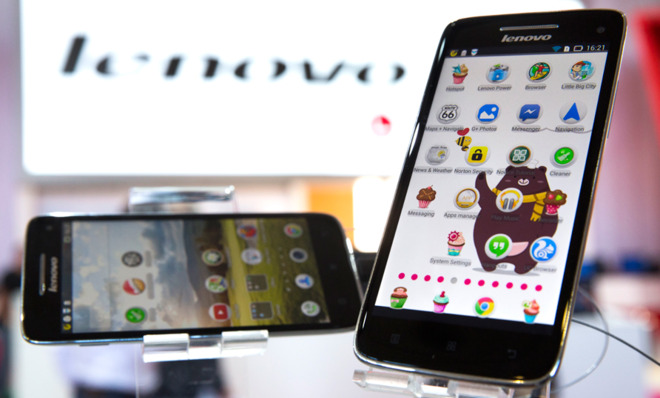Why PC giant Lenovo is betting on Motorola
The Chinese company wants to rule the world, of course — one smartphone at a time


A free daily email with the biggest news stories of the day – and the best features from TheWeek.com
You are now subscribed
Your newsletter sign-up was successful
In 2005, a relatively obscure Chinese tech company called Lenovo bought the personal computer business of IBM, the American company so important to the development of the PC that it was the generic name for non-Apple computers before the great Mac vs. Windows war of the 1990s. Lenovo has been the world's largest PC maker since 2013, and last week the company signed on to buy IBM's low-end server business for $2.3 billion — almost $1 billion more than it paid for its PC business.
On Wednesday, Lenovo agreed to drop $2.91 billion on another American tech pioneer, Motorola. Specifically, Lenovo is buying Motorola's handset business, the Motorola brand name, and almost 2,000 patents from Google. The search giant bought Motorola Mobility in 2011 for $12.5 billion. (It's not as bad as it sounds for Google: It has already sold off some of Motorola's other assets, and it's keeping the vast majority of its patents.)
It's pretty clear what Google is getting out of the deal: It's shedding a money-bleeding hardware subsidiary it may never have really wanted, keeping the patents it needs to protect its Android mobile operating system, and reducing friction with the manufacturers of Android-based smartphones, especially Samsung and Huawei Technologies Co. (HTC), the No. 1 and No. 3 smartphone makers, respectively (Apple is No. 2).
The Week
Escape your echo chamber. Get the facts behind the news, plus analysis from multiple perspectives.

Sign up for The Week's Free Newsletters
From our morning news briefing to a weekly Good News Newsletter, get the best of The Week delivered directly to your inbox.
From our morning news briefing to a weekly Good News Newsletter, get the best of The Week delivered directly to your inbox.
But what does Lenovo get? A shot at world domination. "We dream to become a global player," CEO Yang Yuanqing told BloombergBusinessweek. "You must be a global player to have global presence. Only being in China and emerging markets is not enough."
Lenovo's own smartphones already constitute 4.7 percent of the world market, but 90 percent of those sales are in China. Motorola only has about 1.7 percent of global sales, but as with IBM, it gives Lenovo entrée into Western markets. Yang says his company will keep both the Motorola and Lenovo brands for its smartphones, sometimes in the same markets.
"Lenovo was strong in its home country in PCs, but the IBM buy gave them a global brand and a lot of access," says Forrester Research's Frank Gillett. "In buying Motorola, they are buying a major brand, and a company that has established relationships with carriers." On top of that, he adds, the Motorola buy "puts Lenovo in position to have leading offerings in smartphones, tablets, and PCs — a vital trifecta that no other global manufacturer has — besides Apple."
That's pretty ambitious, and there's a sizable gap between Lenovo-Motorola's combined 6.4 percent market share and No. 2 Apple's 17 percent slice of the global pie. The markets aren't too high on Lenovo's chances — its share price dropped 8.2 percent on the Hong Kong bourse after news of the deal hit the wires.
A free daily email with the biggest news stories of the day – and the best features from TheWeek.com
But it's hard to ignore its impressive growth in the PC market. "Do not underestimate Lenovo," says JPMorgan Chase analyst Mark A. Moskowitz. "Lenovo could replicate their success in PCs, particularly at the low end of smartphones."
Or Motorola could sink further into irrelevance under Lenovo's watch. But after years of trying to acquire a big name in the industry — including, reportedly, Motorola back in 2011 — Lenovo is getting a shot to prove its mobile mettle.
Peter has worked as a news and culture writer and editor at The Week since the site's launch in 2008. He covers politics, world affairs, religion and cultural currents. His journalism career began as a copy editor at a financial newswire and has included editorial positions at The New York Times Magazine, Facts on File, and Oregon State University.
-
 Film reviews: ‘Send Help’ and ‘Private Life’
Film reviews: ‘Send Help’ and ‘Private Life’Feature An office doormat is stranded alone with her awful boss and a frazzled therapist turns amateur murder investigator
-
 Movies to watch in February
Movies to watch in Februarythe week recommends Time travelers, multiverse hoppers and an Iraqi parable highlight this month’s offerings during the depths of winter
-
 ICE’s facial scanning is the tip of the surveillance iceberg
ICE’s facial scanning is the tip of the surveillance icebergIN THE SPOTLIGHT Federal troops are increasingly turning to high-tech tracking tools that push the boundaries of personal privacy
